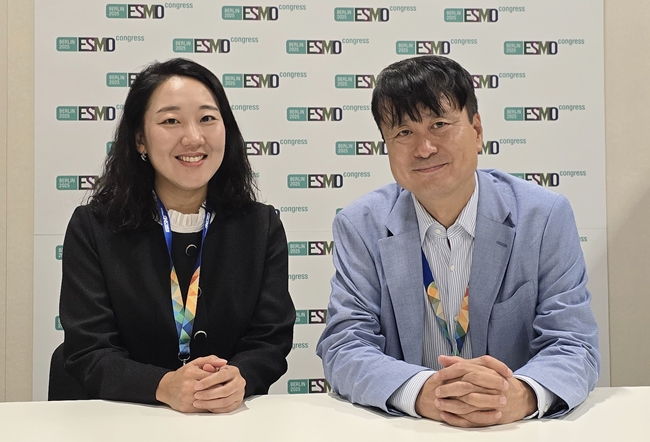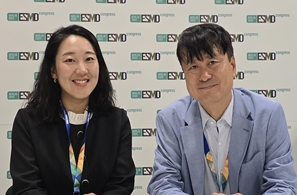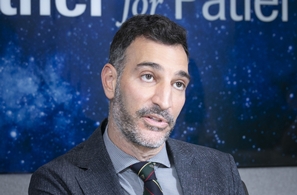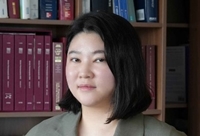- "GI Innovation challenges melanoma"
- by Hwang, byoung woo | translator Hong, Ji Yeon | Oct 21, 2025 06:18am
GI-102 is drawing attention for its potential to overcome resistance, as it showed clinical improvement, including tumor shrinkage of more than half, even in melanoma patients who did not respond to PD-1 antibody monotherapy. Based on the latest results, the company has strategized to expand collaboration with global pharmaceutical companies for joint clinical trials and aims for first-line treatment for melanoma.
DailyPharm met with Myoung Ho Jang, CEO of GI Innovation, and Nari Yun, Director, at the ESMO Congress 2025 to hear about the significance of the GI-102 poster presentation and the company's future strategy.

"Demonstrated activity in patients refractory or resistant to immunotherapies…potential to overcome Keytruda resistance"
The new drug candidate GI-102 is a fusion protein developed using the company's proprietary "Immune-cytokine" platform.
It is structured to maintain the anti-cancer immune activation function of IL-2 (Interleukin-2) while reducing toxicity by combining it with the immunomodulatory protein CD80. It works by a differentiated mechanism that directly activates immune cells and suppresses regulatory T-cells (immunosuppressive cells), thus being assessed as an innovative candidate that can compensate for the limitations of existing PD-1 antibodies.
According to the GI-102 poster presentation at ESMO Congress 2025, the drug showed significant anti-cancer activity in a combination trial targeting patients refractory or resistant to PD-1 antibodies.
In the initial combination trial, 10 melanoma patients who were refractory to PD-1 antibodies, the combination of GI-102 and Keytruda (pembrolizumab) recorded an objective response rate (ORR) of 40% and a disease control rate (DCR) of 70%.
Notably, a case was presented where a patient whose disease had progressed just two months after initial Keytruda treatment achieved a partial response (PR), with the tumor shrinking by approximately 59%, after the GI-102 combination therapy. In this case, the tumor reduction (cPR, -59%) and progression-free survival (PFS) of 3.9 months were observed when GI-102 was combined with the same drug backbone.
Na Ri Yun, Executive Vice President of GI Innovation (Clinical Dev & Strategy), explained, "The fact that the tumor shrank by more than half in a patient who did not respond to PD-1 antibody monotherapy signifies the potential to overcome refractoriness," and added, "The key finding is that GI-102 dramatically increases the number of immune cells (lymphocytes) that determine the response rate of immunotherapies."
The GI-102 combination group also showed an increasing trend in anti-cancer immune cells, such as CD8⁺ and CD4⁺ T-cells, as treatment progressed.
Yun mentioned, "We confirmed a clear increase in anti-cancer immune cells, such as CD8⁺ and CD4⁺ T-cells, following the GI-102 combination," and added, "When the number of immune cells increases, there are more targets for the PD-1 antibody to bind to, which ultimately strengthens the anti-cancer effect."
Notably, no dose-limiting toxicities (DLT) were observed in this combination trial. Most adverse events, such as fever and chills, were mild (Grade 1-2).
Although elevated liver enzymes occurred transiently in some patients during the first treatment cycle, they recovered to the normal range. The company explained that "global pharmaceutical companies also assessed these to be manageable through meetings."
Yun said, "The frequency of side effects was significantly low compared to conventional IL-2 class drugs, and patients tolerated the treatment well." She added, "We have obtained very positive data in terms of safety."
Myoung Ho Jang, CEO of GI Innovation, said, "This data confirmed that GI-102 monotherapy shows activity comparable to global blockbuster immunotherapies," and assed that "The combination therapy was confirmed to induce a response even in patient populations that existing PD-1 antibodies could not reach."
Jang added, "GI-102 is garnering high interest from global pharmaceutical companies because it is an IL-2-based immunocytokine that suppresses regulatory T-cells."
Active discussions with global pharma..."A head-to-head challenge in first-line melanoma treatments"
GI Innovation engaged in discussions with global pharmaceutical companies at the conference regarding collaborative clinical trials for first-line melanoma treatment.
Currently, PD-1 antibodies like Keytruda and Opdivo (nivolumab) are approved as first-line monotherapies for melanoma.
Jang said, "We are having positive discussions with global pharmaceutical companies here at ESMO 2025," and added, "We are reviewing a randomized clinical design to 'head-to-head' compare the efficacy of the GI-102 combination effect against PD-1 monotherapy."
Yun added, "Melanoma is the only cancer type where PD-1 monotherapy is the standard of care. Proving the superiority of GI-102 here will increase its potential for expansion into other solid tumors."
The fact that the company is considering a direct comparison clinical trial against a first-line monotherapy is evidence of its confidence in the results.
Notably, GI Innovation stated that it is considering developing GI-102 not merely as a technology transfer (L/O) but as a co-clinical/co-commercialization model with global pharmaceutical companies.
Jang stressed, "While we are in discussions for the technology transfer of GI-101A, we prefer a model where the company retains certain rights and co-develops GI-102 with a global pharmaceutical company," and stressed, "Our goal is to increase long-term value through a direct commercialization structure, creating direct revenue rather than just royalty income."
Yun added, "We favor a partnership structure where the company proactively secures rights so as not to be swayed even if a global pharmaceutical company's internal priorities change."
In conclusion, the analysis suggests that the discussions held at ESMO Congress 2025 confirmed GI-102's competitiveness in the global market.
Finally, Jang said, "Although we are starting with melanoma, we expect a rapid expansion into other solid tumors through off-label use as clinical evidence accumulates," and added, "The conference provided us with confidence that GI-102 possesses genuine competitiveness in the global market."
-

- 0
댓글 운영방식은
댓글은 실명게재와 익명게재 방식이 있으며, 실명은 이름과 아이디가 노출됩니다. 익명은 필명으로 등록 가능하며, 대댓글은 익명으로 등록 가능합니다.
댓글 노출방식은
댓글 명예자문위원(팜-코니언-필기모양 아이콘)으로 위촉된 데일리팜 회원의 댓글은 ‘게시판형 보기’와 ’펼쳐보기형’ 리스트에서 항상 최상단에 노출됩니다. 새로운 댓글을 올리는 일반회원은 ‘게시판형’과 ‘펼쳐보기형’ 모두 팜코니언 회원이 쓴 댓글의 하단에 실시간 노출됩니다.
댓글의 삭제 기준은
다음의 경우 사전 통보없이 삭제하고 아이디 이용정지 또는 영구 가입제한이 될 수도 있습니다.
-
저작권·인격권 등 타인의 권리를 침해하는 경우
상용 프로그램의 등록과 게재, 배포를 안내하는 게시물
타인 또는 제3자의 저작권 및 기타 권리를 침해한 내용을 담은 게시물
-
근거 없는 비방·명예를 훼손하는 게시물
특정 이용자 및 개인에 대한 인신 공격적인 내용의 글 및 직접적인 욕설이 사용된 경우
특정 지역 및 종교간의 감정대립을 조장하는 내용
사실 확인이 안된 소문을 유포 시키는 경우
욕설과 비어, 속어를 담은 내용
정당법 및 공직선거법, 관계 법령에 저촉되는 경우(선관위 요청 시 즉시 삭제)
특정 지역이나 단체를 비하하는 경우
특정인의 명예를 훼손하여 해당인이 삭제를 요청하는 경우
특정인의 개인정보(주민등록번호, 전화, 상세주소 등)를 무단으로 게시하는 경우
타인의 ID 혹은 닉네임을 도용하는 경우
-
게시판 특성상 제한되는 내용
서비스 주제와 맞지 않는 내용의 글을 게재한 경우
동일 내용의 연속 게재 및 여러 기사에 중복 게재한 경우
부분적으로 변경하여 반복 게재하는 경우도 포함
제목과 관련 없는 내용의 게시물, 제목과 본문이 무관한 경우
돈벌기 및 직·간접 상업적 목적의 내용이 포함된 게시물
게시물 읽기 유도 등을 위해 내용과 무관한 제목을 사용한 경우
-
수사기관 등의 공식적인 요청이 있는 경우
-
기타사항
각 서비스의 필요성에 따라 미리 공지한 경우
기타 법률에 저촉되는 정보 게재를 목적으로 할 경우
기타 원만한 운영을 위해 운영자가 필요하다고 판단되는 내용
-
사실 관계 확인 후 삭제
저작권자로부터 허락받지 않은 내용을 무단 게재, 복제, 배포하는 경우
타인의 초상권을 침해하거나 개인정보를 유출하는 경우
당사에 제공한 이용자의 정보가 허위인 경우 (타인의 ID, 비밀번호 도용 등)
※이상의 내용중 일부 사항에 적용될 경우 이용약관 및 관련 법률에 의해 제재를 받으실 수도 있으며, 민·형사상 처벌을 받을 수도 있습니다.
※위에 명시되지 않은 내용이더라도 불법적인 내용으로 판단되거나 데일리팜 서비스에 바람직하지 않다고 판단되는 경우는 선 조치 이후 본 관리 기준을 수정 공시하겠습니다.
※기타 문의 사항은 데일리팜 운영자에게 연락주십시오. 메일 주소는 dailypharm@dailypharm.com입니다.
- [Op-Ed] Patients, no time left for 'new drug comb therapies'
- Special Contribution | Eo, Yun-Ho









